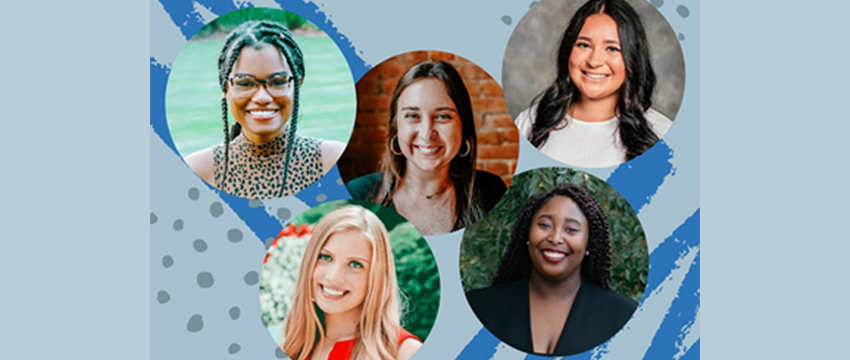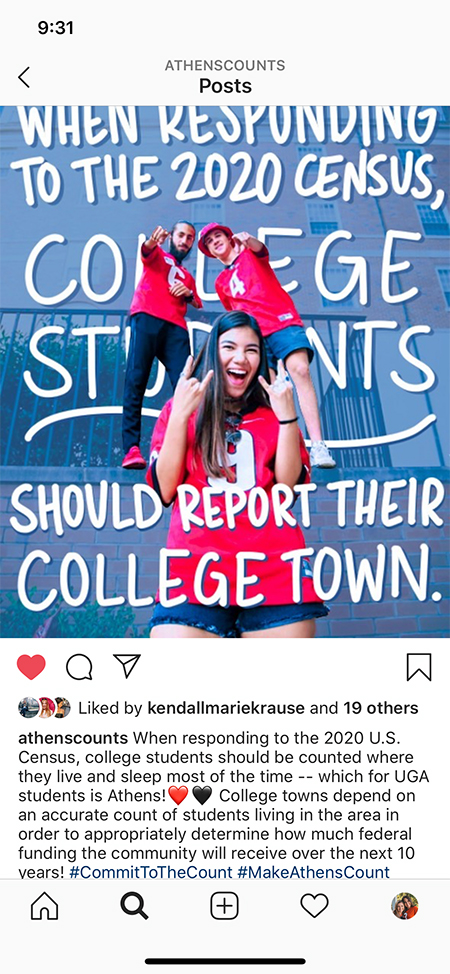Bateman team changes course in competition to promote Census 2020

Bateman team changes course in competition to promote Census 2020
Editor’s Note: to complete the Census 2020 online, please visit my2020census.gov.
Census 2020 is just one of the many events that is in turmoil because of the coronavirus. Generating ideas that will help organizations out of this crisis is one reason why projects like the Bateman team competition is so important.

The Bateman competition is an annual challenge sponsored by the Public Relations Student Society of America. More than 65 student teams from universities and colleges around the country compete to see which team creates the best integrated communications campaign. One client is selected each year and frequently these projects focus on community awareness projects like this year’s client, Census 2020.
A team of five Grady College public relations students—Ashleigh Burroughs, De’Andra Gaston, Sarah Hawkins, Olivia Muller and Lottie Smalley— have been researching and creating their community outreach campaign since last November. The plan, specified by the competition, had to be enacted between Feb. 10 and March 20, 2020.
“From our research, we learned that most people know a little about the Census, but they don’t know all of the things that the Census is used for from the allocation of federal funding to redistricting,” said Gaston, a senior public relations major. “We hope that our campaign persuades residents to participate in the Census for the good of the city of Athens.”
In addition to helping determine federal funding for community services like school programs, fire and emergency services, roads, and healthcare services, the Census provides data for other benefits including political representation, economic growth and emergency preparedness planning.
Each team was challenged with strategizing an integrated public relations plan to educate the local community about the importance of the Census and how easy it is to participate. The teams were also asked to select one hard-to-reach or hard-to-count group to target like renters, households with annual incomes of less than $35,000 or those who have less than a high school education.
The UGA Bateman team coordinated several online surveys and focus groups as part of their research, then created a social media campaign and two events to increase awareness and exposure.
“We chose the title ‘Athens Counts,’” Hawkins said, “because we wanted to let the people know about all the benefits of the Census to this place we all love.”
The events included a town hall meeting that was to have taken place with Athens Clarke County Mayor Kelly Girtz, Georgia State Representative Spencer Frye and Rebecca Hart, CEO of Fair Count, an organization dedicated to ensuring Georgians participate in Census 2020. Interested students had registered for every spot in the second event, a Create-a-thon social media brainstorming session.
“When I met with the team just before spring break, they had crossed every T and dotted every I for these events,” said Karen Miller Russell, the team’s faculty adviser. “But we knew COVID-19 was starting to spread across the United States, and we had to leave without knowing what would happen next.”
Not surprisingly, the team had to cancel both events once the mandates for social distancing were enacted.
Fortunately, team members had a strong foundation and were able to shift gears to rely exclusively on social media and virtual communication, pushing out their digital messages of awareness and education on Facebook, Instagram, Twitter and Tik Tok.

“Pivoting entirely through Facetime and phone calls was quite challenging in all honesty,” Burroughs said. “I will say, though, we had firm objectives and tactics in place, so we never lost focus on the end goal. The firm foundation definitely made it easier to pivot when things didn’t go as planned.”
The team learned valuable lessons with the change of their plans. ‘Hope for the best, plan for the worst’ is a common phrase, and one that rang true these changes.
“We thought about troubleshooting during the actual town hall, but never imagined the chaos that would ensue over the next week,” Burroughs said.
The final project was turned in early April.